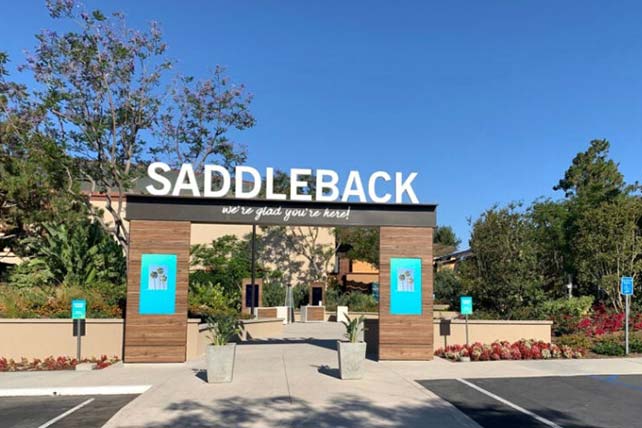(RNS) — Southern Baptists have long disagreed over just about everything — from the role of women in the church and which Bible is best to debates over Calvinism and “alien immersion” (whether people who were baptized outside the denomination can be church members).
Despite their disagreements, joining the Southern Baptist Convention has historically been relatively easy. And getting kicked out was difficult.
“In Southern Baptist life, basically you are deemed in until you have proven that you are out,” said Adam Greenway, former president of Southwestern Baptist Theological Seminary.
The issue of who gets to be a Southern Baptist made international headlines this week after the denomination’s Executive Committee voted to oust one of the nation’s largest and best-known churches for having a woman preaching pastor.
On Tuesday (Feb. 21), Saddleback Church in Lake Forest, California, was “deemed not to be in friendly cooperation” with the SBC for having Stacie Woods — wife of newly appointed senior pastor Andy Woods — as a regular preacher. Her role conflicts with a section of the denomination’s statement of faith, the Baptist Faith and Message, which restricts the office of pastor to men. Saddleback had previously been reported to the SBC’s credentials committee, which reviews the status of churches, for ordaining several longtime women staffers in 2021.
RELATED: Saddleback Church Kicked out of SBC Over Female Pastors
Four other churches were also removed for having women pastors, including New Faith Mission Ministry in Griffin, Georgia, whose pastor has since claimed the church was never part of the SBC.
Those congregations were the first to be expelled from the SBC on a national level for having women pastors since the ban on women pastors was instituted in 2000.
Churches have been removed in the past from Baptist state conventions or local associations for having women pastors. In 2009, the Georgia Baptist Convention disfellowshipped First Baptist Church of Decatur for hiring a woman pastor, then followed up in 2010 by kicking out Druid Hills Baptist Church for the same reason. In 2015, a Tennessee Baptist local association removed Greater Tabernacle Missionary Baptist Church in Lawrenceburg for having a woman pastor.
Greenway said disputes over the status of churches are more common at the local or state level because people in those settings are more likely to know what other churches are doing. With more than 40,000 churches, that’s less likely at the national level of the SBC.
Those local or regional groups often have different rules for how closely churches have to follow their doctrines. Some require churches to completely agree with the Baptist Faith and Message. Some use other statements of faith.
At the SBC level, the rules have been more flexible. Founded in 1840, the denomination didn’t have an official statement of faith till 1925. That same year, the SBC started the Cooperative Program, which pools money from churches to fund missions, seminaries and other ministries around the country.
“That’s not an accident,” said Bart Barber, current SBC president and pastor of First Baptist Church in Farmersville, Texas, who has spent years studying SBC polity. Before 1925, local churches that identified as Baptist funded individual SBC institutions and causes.
Once they pooled their money, a more detailed statement of faith was needed.
“There needed to be more trust,” he said.
The disputes over churches often play out at annual meetings — when one church tries to block another from participating. And the issues involved have varied widely.
In 1977, the California state convention rejected representatives, known as messengers, from a Fresno church that practiced alien immersion and “open Communion” and debated those issues for years. So did Baptists in Kentucky and Arkansas. California Baptists also refused to recognize a church in Corona in 1980 after it dropped the word “Baptist” from its name and a church in 1993 that had a woman pastor.

